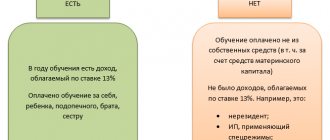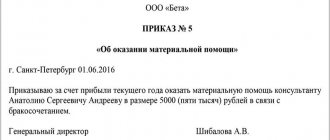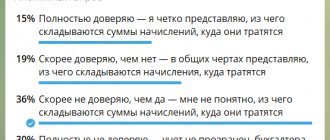Family foster care is the most affordable option for family placement for children who do not have orphan status.
This method is also used for those children for whom adoption cannot be formalized.
The task of foster care and the family raising a child is to socially adapt the child, improve his self-esteem, expand his social circle, as well as take care of physical health with the help of educational, pedagogical and psychological techniques.
Dear readers! To solve your problem right now, get a free consultation
— contact the duty lawyer in the online chat on the right or call: +7 Moscow and region.
+7 St. Petersburg and region. 8 Other regions of the Russian Federation You will not need to waste your time and nerves
- an experienced lawyer will take care of all your problems!
What is a foster family?
Foster care is considered one of the simplest and fastest forms of foster care for minor children.
The agreement is concluded in several cases:
- The child’s parents are alive and have not been deprived of parental rights, but assistance is required in raising them and temporary placement with educators. For example, if the mother and father are in the process of deprivation, are experiencing a difficult financial situation or are seriously ill. Parents remain with the child, but need assistance in proper upbringing. If it is impossible to use other forms of arrangement: adoption, guardianship, trusteeship, foster family.
- If a child left without parental care has not reached the age of majority, but is sent from an orphanage to study at a secondary specialized education institution for working professions.
- In relation to a person from among orphans (from 18 to 23 years old), if he is studying in a secondary specialized education organization. But he needs adult help for socialization.
The purpose of establishing patronage is social assistance, protection of property and non-property rights of children. A child in respect of whom an agreement has been concluded with the guardianship authorities avoids ending up in an orphanage and receives guaranteed guardianship and care.
Important! The law on foster care has not yet been considered in its final version, so the conditions for the conclusion and duration of the agreement are different everywhere. We will look at the example of Moscow, where patronage has become widespread.
In which cities does patronage operate?
Patronage laws do not apply throughout Russia - they have been adopted only in a few regions:
- Regions: Altai, Krasnoyarsk, Krasnodar, Perm, Primorsky, Stavropol.
- Regions: Moscow, Arkhangelsk, Bryansk, Samara, Ivanovo, Vladimir, Volgograd, Irkutsk, Kaliningrad, Kostroma, Kaluga, Bryansk, Murmansk, Novgorod, Nizhny Novgorod, Tver, Orenburg, Pskov, Sakhalin, Ryazan, Samara, Smolensk, Tomsk, Tyumen, Chitinskaya, Yaroslavl.
- Republics: Adygea, Dagestan, Kalmykia, Chuvashia, Karelia, Mari El, Bashkortostan, Udmurtia.
- KHMAO.
In the Novosibirsk, Rostov, Omsk, and Chelyabinsk regions, experimental work is being carried out to introduce patronage, but laws have not yet been adopted.
Patronage and patronage: differences
Many people, due to the consonance of the concepts, confuse them, although there are significant differences between them:
- patronage is established for adults with legal capacity who, due to health problems, need household help from outsiders;
- Patronage is paid guardianship over a child or a socially disadvantaged family if the parents cannot cope with their upbringing on their own.
Patronage can be used in the form of concluding a contract for children, and educators are actually endowed with the rights and responsibilities of guardians. If patronage is provided to the family, the child is not removed, but the appointed teacher regularly visits the minor, controls the parents and helps in upbringing.
Differences from guardianship and adoption
Patronage, unlike adoption or guardianship, does not always imply cohabitation of the teacher with the child: for example, if we are talking about post-boarding or social care, he only visits the minor with established frequency.
From a legal point of view, patronage and guardianship are similar: the ward has no rights to the property of the trustees, just as they do not have rights to his. Adoptive parents are endowed with all the rights of parents and can inherit the property of adopted children.
Cancellation of patronage and guardianship is carried out at the request of the trustees or at the initiative of the OOiP without court intervention. An adoption can only be canceled by a court decision if there are guilty actions of the adoptive parents.
Requirements for foster carers
The same requirements are established for foster carers as for guardians:
- adult age, full legal capacity;
- having a permanent place of residence;
- the absence of dangerous diseases that prevent the child from being taken into the family;
- absence of alcohol or drug addiction;
- disability group 1;
- completing training at a school for foster parents;
- no criminal record.
Citizens who were previously deprived of parental rights and who have ceased to be adoptive parents through their fault have no right to take children into foster care. It is not allowed to enter into an agreement with persons who are in a same-sex marriage or who have been removed from guardianship duties.
Note! In some regions, completing a guardianship course is not required to establish post-boarding care.
Mentoring
This form of child arrangement is called “guest mode” or “weekend family”.
On weekends, holidays or vacations, the child stays with the mentor's family. This gives him the opportunity to understand how life works in a family, gain skills in housekeeping and communication with adults and other children in the home circle. It’s as if he has a new relative, a friend, to whom he can turn for support and advice. Mentoring provides moral support not only when the child is visiting, but also during his stay in a child care institution - usually there is correspondence or telephone communication between them. Often mentors help children with treatment and choosing a profession, buy clothes, books and toys. Pros:
- Registration does not require passing a full medical examination and collecting a bunch of certificates.
- The opportunity to take in children temporarily removed from dysfunctional large families or from convicted parents and those for whom it is extremely difficult to find a permanent family.
- As a transitional stage before guardianship or adoption, mentoring provides an opportunity to take a closer look at each other and allows them to understand whether they will be good together.
- When adopting guardianship or adoption, it will be easier for the pupil to survive the adaptation - after all, he already has experience of living in a family.
Minuses:
- This form of communication with the ward is not established by law. There are no approved norms, rules, or required list of documents - all requirements are established by the director of the child’s child care institution.
- The director may at any time prohibit the child from being picked up.
- You cannot take children under 7-8 years of age to visit, because they do not understand why they are taken and returned, they have not yet realized that there can be not only parents, but also “relatives”.
State assistance:
Not provided for by law.
Types of patronage
Patronage is divided into several types, differing in the age of the children and the functions of the teacher.
Social
Social patronage implies the preservation of parental care and the use of a set of measures aimed at promoting the normal development and upbringing of a minor.
This form of patronage is characterized by concluding an agreement with a public organization or other authorized organization free of charge. Parents do not pay anything for this, and the teacher receives payments from the state. The maximum number of accompanying families is 5.
What are the responsibilities of a teacher under social patronage:
- monitor the child’s progress at school;
- provide social support to parents, help cope with conflicts, correct behavior and communication with children;
- give recommendations on the formation of leisure time, help expand the range of interests;
- control the order and sanitary conditions in the pupil’s home;
- monitor the health status of the minor and, if necessary, contact medical institutions;
- provide legal support in resolving legal issues.
Parents who have health problems and need help raising their children, as well as families with an unfavorable psychological situation that impedes the adequate development of the child, can apply for social patronage.
Deadlines
Social patronage can be short-term – up to six months, and long-term – from six months or more.
Post-boarding school
After leaving boarding schools, children are often disoriented and have no idea about social behavior in society. For this purpose, post-boarding patronage is established for wards aged 18 to 23 - a set of measures aimed at adapting graduates.
The agreement is concluded between the child and the organization for orphans on the initiative of the pupil. It is allowed to draw up a document with him, the educational institution and the potential teacher. In this case, the consent of the ward and the latter will be required. The maximum number of pupils is 5.
The post-boarding teacher undertakes:
- perform functions in accordance with the terms of the contract;
- visit the pupil on time;
- take care of the physical, mental, moral development of the child;
- assist the graduate in the exercise of his rights and legitimate interests;
- provide support in further self-determination;
- create leisure activities for the ward;
- provide psychological support to the ward, give recommendations on communicating with other people.
If conflict situations arise, the teacher is obliged to inform the educational institution about this. Further actions will be chosen jointly, taking into account the individual characteristics and opinion of the child.
Deadlines
The validity period of the post-boarding agreement is determined individually depending on the circumstances.
Foster family
A foster family is essentially similar to guardianship: a child is given to an adult to raise and then they live together. This is possible if a minor is left without parental care, but no one wants to adopt him or establish guardianship. This is a temporary arrangement for finding a permanent family.
The maximum number of foster children in a family is 3. The number can be increased only if all children are siblings.
The teacher is vested with the rights and responsibilities of a guardian:
- represent the interests of a minor;
- take care of moral, physical, mental, moral development;
- receive payments for the child and for performing the functions of a teacher;
- report on the expenditure of funds to the OO&P;
- act as a legal representative before government agencies and commercial institutions;
- notify the POiP about a change of residence no later than the day following the date of move;
- organize the leisure time of the ward.
Note! If a minor has a brother or sister, the contract is concluded in respect of both children, provided that their separation may harm them. A couple who is not officially married cannot take custody of the same child.
If a child finds himself without parental care, close relatives do not want to adopt him or take care of him, the priority right to adoption is given to a foster family.
The period of cohabitation is no more than 6 months. This time is necessary to select a family for permanent residence.
How to find a child?
If you don't know who you want to foster, look up the children's information at the Federal Bank. It contains information about minors for adoption, guardianship or foster care.
The second option is to contact the OOiP. They will help you choose a child, but to conclude a contract you will have to go through a number of procedures.
All about patronage. How to become a foster carer and get paid for it?
Paid and gratuitous guardianship - similarities and differences
Term of education
The period during which a minor will be in the care of a relative or adoptive parent is determined on an individual basis. It should be noted that, according to family policy in Russia, preference is given to blood parents. They can express a desire to take the child away at any time, but to do this they must obtain the right to return to the status of a legal representative.
If the father and mother are deprived or limited in their rights, they can send documents to the court for restoration, provided that the circumstances due to which the deprivation or restriction occurred are invalid and this is confirmed by information from the departments. If they are in general regime correctional institutions or are on the wanted list, the blood parents can exercise the right to take their children away from the foster care provider after their release. If they are declared dead or missing, upon their return, the option of transferring them to their mother or father is also possible.
Initially, when an order and agreement are issued, according to which a relative or adoptive parent is considered a legal representative, the length of stay of the child in the family is not established. These documents are considered invalid when he is transferred to his blood parents or becomes fully capable (after 18 years). In fact, the constant presence of a minor under this kind of protection is possible in the event of the death of his mother and father.
How is a social patronage agreement concluded?
A social patronage agreement is drawn up by parents with a specialized institution from which they are assigned a teacher, or with a specific citizen with the participation of a third party - a social protection authority.
How it all looks step by step:
- A family in need of government support is identified. Information comes from teachers, IPDN, other authorized persons, incl. and from parents.
- Living conditions are checked and family members are interviewed. Based on the results, an act is drawn up.
- A curator (educator) is appointed, and an agreement is concluded with parents with the participation of social protection. The teacher needs to obtain a conclusion on the possibility of establishing social patronage, if it has not been issued previously. If you have a valid conclusion on the possibility of adoption, that will do.
To be appointed as a curator, you must pass a guardian school and a medical examination. The contract is concluded only after this.
Important! Parents who find themselves in difficult situations can also turn to social security for help.
Documentation
To establish social patronage, potential educators must provide:
- statement;
- medical certificate;
- certificate of completion of training at the school of foster parents;
- passport;
- certificate of no criminal record;
- certificate from place of work;
- marriage certificate.
Documents are provided in originals. Copies are made of them, then everything is returned to the owner.
Statement
The application is filled out according to the form established in a particular region.
The following information is usually required to fill out:
- name and address of the authorized body;
- Full name, registration address, passport details, telephone number of the applicant;
- citizenship;
- skills and knowledge in the field of raising children;
- education.
At the end there is a signature and date.
Sample application for the issuance of an opinion on the possibility of being a teacher under an agreement on social adaptation:
Conclusion of the OOiP on the possibility of implementing social patronage
After checking the identity of the applicant, the OOiP issues a conclusion reflecting the complete data:
- FULL NAME. teacher, registration address and actual residence;
- education;
- motives for establishing patronage;
- information from the applicant’s passport;
- decision of the Public Organization and Social Security on the possibility of providing patronage.
The document is signed and stamped by the head of the organization. In the absence of the selected child, information about the applicant is entered into the register of citizens wishing to provide patronage.
Sample conclusion of the guardianship authorities on the ability of a citizen to exercise social patronage:
Social patronage agreement
A social patronage agreement is drawn up when information about the family in need of support is known.
What information is indicated:
- who provides patronage: a specific teacher or institution. In the latter case, a responsible person is appointed;
- Full name, date of birth of the child, details of the certificate or passport;
- reasons for prescribing social assistance: unfavorable situation in the family, poor upbringing of a minor, difficult situation of parents, etc.;
- information about the foster carer: passport details, full name, phone number;
- rights and obligations of the parties;
- frequency of control by the curator;
- features of remuneration;
- contract time.
The agreement is drawn up in three copies: one is given to the parents, the second to the curator, and the third remains in the OUiP.
Sample contract for establishing social patronage:
Registration procedure
People who want to help children are required to find out whether a foster care service has been created in their city and what the requirements for educators are. For this purpose, they usually contact the administration (district or city). Upon entering the building, you should immediately go to the Board of Trustees. Authorized persons will provide the necessary information. If a patronage service has been established, it is important to remember the following algorithm of actions:
- Contact the patronage service and write a statement.
- Conduct interviews together with family members living with the applicant.
- Undergo a full medical examination.
- Complete teacher training courses (last no more than 80 hours).
- Pass the check (employees of the patronage service will visit the applicant’s family).
- Receive a list of required documents.
- Pass a psychological compatibility test, on the basis of which a child will be selected.
- Meet your future student.
- Draw up an agreement with the patronage service.
The authorized bodies will help you decide on the child’s choice and provide the necessary assistance (medical, pedagogical, psychological). Failure to follow the action algorithm may result in the foster care service rejecting the nominated teacher candidate.
How to draw up a post-boarding patronage agreement: step-by-step instructions
If you are between 18 and 23 years old and need the help of a post-boarding supervisor, you need to take several steps:
- Submit an application to the OOiP for consent to post-boarding care. Within 15 days, the documents will be checked, and the educational institution will select a teacher. Based on the results, an act is drawn up.
- The teacher applies to the educational institution at his place of residence after passing a medical examination, submits an application and documents to establish patronage. Everything is reviewed within 7 days. During this time, the POiP checks his living conditions and studies his personal qualities. Based on the results, a housing inspection report is drawn up.
- Based on the results, an agreement is concluded between the child and the curator.
The contract is valid for up to 1 year. Subsequently, it can be extended until the ward reaches 23 years of age.
Documentation
A graduate of a boarding school only needs to submit an application to the Educational Institution.
An extended list of documents is required from the teacher:
- statement;
- passport;
- certificate of no criminal record;
- medical report in form 164u.
After checking the property and equipment, in order to conclude an agreement, you will need an inspection report of the living conditions.
Statement and Conclusion
The application and conclusion on the possibility of becoming a post-boarding teacher are drawn up in the same form as for establishing social patronage.
Post-boarding care agreement
The agreement is concluded between the student and the curator with the participation of the educational institution.
What information is indicated:
- complete information about the parties: passport series and number, citizenship, registration, education, residential addresses;
- appointment of a specific citizen as a post-boarding teacher based on the conclusion (details);
- obligations and rights of the child, curator;
- number and frequency of inspections;
- duration of the agreement.
At the end, the signatures of the curator, the adult ward and the representative of the OUiP are indicated. One copy remains for each person.
Sample agreement on post-boarding care:
Peculiarities
Patronage is a form of education and provision of necessary assistance to orphans and children without parental care. In some cases, this term is used in relation to a child who is in a family with an unfavorable environment. The institution of foster care is one of the forms of substitute guardianship. Its main goal is to protect the rights and interests of a child who, for whatever reason, cannot be adopted.
Foster care is implemented in a number of regions of Russia on the basis of repurposed orphanages, which become authorized OOP organizations. Orphans, children whose parents are unknown, whose parental rights are limited, or who are unable to raise a child for health reasons are placed in a foster family. Patronage is regulated by a special agreement concluded between the PLO and the teacher. A mandatory condition of the agreement is the division of responsibility for protecting the rights and legitimate interests of the child. As in a foster family, children over 10 years of age must give their consent to be placed in a foster family.
In the case of foster care, the child retains all the rights of pupils of state institutions for orphans and receives financial support from the state, but the host family takes on the educational role. At the same time, parents are professional educators and qualified assistants who receive wages. Candidates for foster carers attend special classes in the authorized service, which help them better understand the behavior of children and tell them what to do in difficult situations. After the child is accepted into the family, foster care providers work with foster care providers.
The advantage of this form of family arrangement is flexibility, which allows you to place any child in a family: since foster carers become employees of an authorized organization (orphanage), they have seniority, are paid a small salary and a child benefit, which is important for many families. But for the majority of foster carers, the main help is not financial assistance, but the support of specialists - psychologists, social educators, doctors, lawyers
Social workers help the family with formal settlement and provide legal assistance.
Types of patronage and children's rights
Patronage is continuous
and
periodic
. In the first case, the child is temporarily in the family until the issue of his custody is finally resolved. In the second, the family takes the child on weekends or holidays, for a period of 1-2 days to 3 months. The foster care agreement establishes the term and conditions for the formation of temporary guardianship over the child. People who want to become foster carers must undergo special training. Foster carers can have from 1 to 4 children at a time. The child's contact with his birth family is encouraged.
A child in foster care has a number of rights:
- Right to social security.
- Property rights, such as ownership of residential premises or the provision of residential premises.
- The right to communicate with parents or other blood relatives.
- The right to medical care and provision of treatment and preventive care.
- The right to additional government assistance, since children in foster care retain the status of children left without parental care.
Other forms of foster family
Foster care refers to the social institution of a substitute family, which includes any family where a child is raised by non-natural parents. According to their legal status, foster families are divided into non-professional
and
professional
.
Adoptive families are classified as unprofessional
- an indefinite form of adoption of a child, where substitute parents are endowed with the same powers as natural parents.
Another type is a guardian family
, in which case the parents receive parental rights until adulthood and benefits from the state.
Professional families include families whose parents are paid a salary to take care of the child - these are a foster family, a foster family, a family center, a family educational group and a family-type orphanage.
How to take a child into foster care?
You can take a minor into foster care while living with a family.
What is needed for this:
- Pass a medical examination and receive a conclusion in form 164u confirming the absence of dangerous diseases.
- Contact the OUiP to undergo training at the school of guardians. The duration of study depends on the standards of a particular region, on average it is 70 hours. Based on the results, exams are taken and a certificate is issued.
- Submit an application to the Department of Educational Institutions to obtain an opinion on the possibility of drawing up a foster care agreement.
- Provide housing for OO&P employees to check living conditions.
- Receive a condition inspection report.
- Find the child and meet him. The meeting takes place in the presence of an OO&P employee, who draws up a report based on the results. If necessary, there may be several meetings. The opinion of the minor is taken into account and reflected in the act.
- Choose an accompanying organization that will provide comprehensive assistance. You can't refuse this. The list of organizations is provided by OOiP.
- Submit an application to the OOiP to conclude a foster care agreement, draw up an agreement. This is done within 10 days after the issuance of the act of transfer of the child.
The procedure takes a total of 1-2 months, including training courses.
Note! If you are in a registered marriage, you will need written consent for patronage from your spouse. It is drawn up in the presence of a representative of the OOiP. Consents of all adult family members are also provided, taking into account the opinions of children.
Documentation
When visiting the OOiP you will need:
- statements: on the issuance of a conclusion, on the execution of an agreement;
- passport;
- certificate of completion of foster parenting courses;
- a certificate confirming no criminal record;
- education document;
- certificate of family composition;
- documents for property: certificate of ownership, lease agreement;
- autobiography;
- characteristics from the place of work;
- salary certificate;
- medical certificate
Important! Lists of documents are regulated by regions independently.
Application for issuance of an opinion
To obtain a conclusion on the possibility of becoming a teacher, an application must be submitted reflecting the following information:
- Full name, citizenship, residential address, registration, education;
- skills in the field of raising children;
- place of work;
- average earnings;
- information about family members: full name, date of birth;
- list of attached documents.
An application for the transfer of a specific child into foster care contains similar data, but additional information about him is indicated.
Sample application for the issuance of an opinion on the possibility of being a teacher under an agreement on social adaptation:
Conclusion of the OO&P
The conclusion of the guardianship authorities states:
- FULL NAME. potential curator;
- the number of children who can be placed in foster care;
- maximum period of patronage;
- other conditions: skills, personal qualities of the applicant, standard of living, etc.
The document is valid for six months from the date of issue.
Sample conclusion of the guardianship authorities on the possibility of being a guardian, adoptive parent, foster carer:
Agreement
An agreement is drawn up between the teacher and the educational institution, or another body responsible for patronage in a constituent entity of the Russian Federation.
What information does it contain:
- name of the municipal body;
- Full name, residential address, passport details of the curator;
- information about the child: date of birth, full name, passport or certificate details;
- a clause on the transfer of a minor to a foster family;
- duties, rights of the curator and OO&P;
- liability of the parties;
- contract time;
- signatures.
The contract is drawn up in quantities of 2 pieces. One is transferred to the OO&P employee, the second remains with the curator.
Sample agreement on foster family (foster care):
How much do they pay for a foster child? Benefits, benefits, minimum salary for foster parents
You can get one hundred thousand rubles from the regional budget. The amount is paid only once, at the moment when the family adopts a disabled person. To receive this money, you need to write an application to the social service responsible for adopted children, attach identification documents of the parent, documents from which it follows that he is a citizen of our country, as well as official papers confirming residence (permanent or most of the time) on the territory of this region.
While the media is calculating how much money guardians can receive, these people themselves say that raising a child from an orphanage is not an easy task. It is necessary not only to provide housing for orphans, but also to provide them with decent living conditions. And everything would be fine, but children are different. And this is not surprising, because who is usually handed over to shelters by new parents? Those with whom there may be difficulties. For example, these are children with mental retardation or other physical and mental health conditions that promise problems in the near future. Guardians who take in such babies are prepared for the difficulties of everyday life.
Payments to foster carers and children
The child retains all benefits intended for orphans.
The general list of payments for curators looks like this:
- one-time benefit upon conclusion of the contract;
- monthly remuneration;
- compensation for utility bills (monthly);
- funds for the maintenance of a minor;
- benefits for certain categories of children left without parental care.
For the last two payments, curators provide reports on forms approved by the laws of the constituent entities of the Russian Federation.
Lawyer's answers to questions about foster care
How many children can I take into foster care?
The permissible number of children per teacher is determined by regional regulations. Typically, patronage is issued for no more than three minors.
On what grounds is a patronage agreement terminated?
The grounds for termination are the expiration of the contract, placement of the child with a guardian or adoptive parent, or transfer to another institution.
Can the curator terminate the contract on his own initiative?
Yes, such a possibility is provided. It is enough to contact the OOiP with an application.
Are guardianship authorities always involved in establishing patronage, or are there specialized institutions in cities?
Yes, in some regions there are such institutions, and all issues are resolved through them. For example, there are Family Arrangement Centers in Moscow and the region.
What are the consequences of removing a teacher from patronage due to his fault?
After this, the citizen will not be able to re-enter into patronage and guardianship agreements, and obstacles to the adoption of children will appear.
Legislation
For the first time, education in the form of foster care was considered by the Family Code: the creation of a foster family, according to Art. 123 SK, is one of the custodial forms of family education. Later, similar provisions were set out in Art. 14 Federal Law “On guardianship and trusteeship”. This is, in fact, the only mention of this form of education in federal legislation - according to these norms, the possibility of its application is transferred to the regions and is made dependent on the presence of appropriate legislation in them.
Therefore, regulations on foster care and other regulations are adopted in the constituent entities of the federation: today more than 40 regions have them, including Moscow and the region, Krasnodar Territory, Bryansk, Vladimir, Pskov, Samara and a number of other regions. Regions regulate all regulations regarding patronage independently.
In 2012, there was an attempt to adopt a corresponding federal regulation, but the law on social patronage caused a wave of criticism and was subsequently rejected by parliament. His opponents, in particular, feared the introduction of the institution of juvenile justice in the country and the creation of social risks that would not take into account “Russian family traditions.” Against the backdrop of controversial attitudes in society and negative reviews from the country's top leadership, they decided to abandon this idea.









